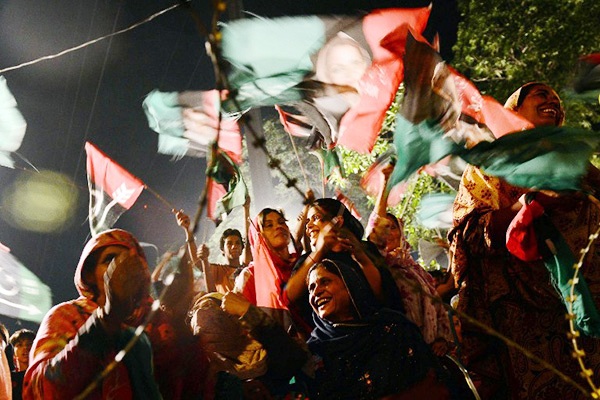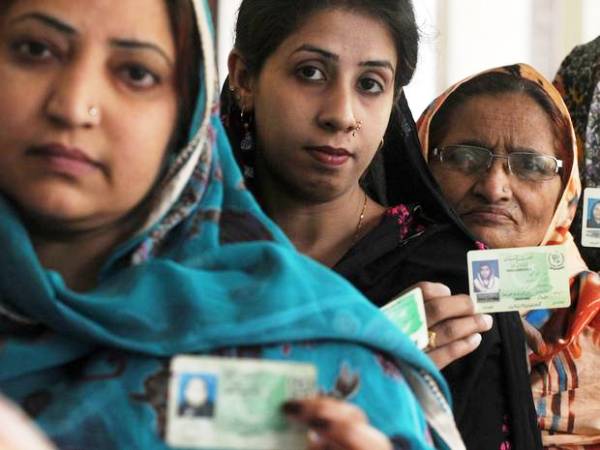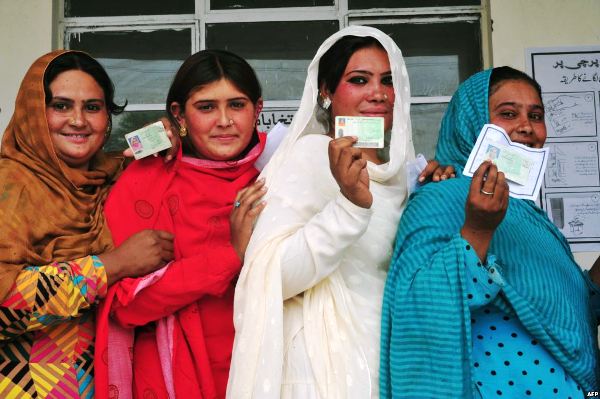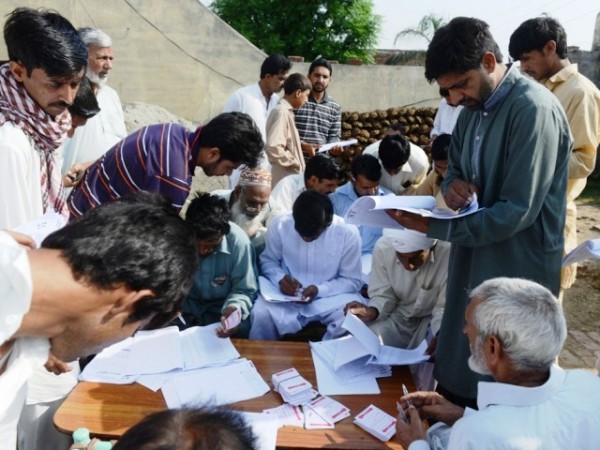![]()
A friend of mine shared a clip on Facebook of a journalist asking Shahid Afridi his views on the development of a girls’ cricket camp in Peshawar (something the journalist said he felt proud of) and Afridi replied that Pathan girls are best at cooking food and should stick to that. This statement did not come as a shock to me.
[embed width="620"]http://www.dailymotion.com/video/x1g30h4_shahid-afridi-view-about-women-s-cricket-team_news#from=embediframe[/embed]
Other than being aware of Afridi’s record of having passed ludicrous remarks about us, Indian Hindus, not being large-hearted enough, which was slammed by many rational Pakistanis, it reminded me of a scene from the Bollywood movie Chak de India starring Shahrukh Khan. It showed officials from India’s hockey federation talking of the quintessential Bhartiya nari (Indian woman) being fit to cook but not being fit to compete in sports tournaments at the international level.
[embed width="620"]http://www.dailymotion.com/video/x18mpob_theatrical-trailer-chak-de-india_creation[/embed]
Other movies portraying similar challenges a girl has to face in an Indian social framework are Dil Bole Hadippa and Bend It Like Beckham, in the context of cricket and football respectively. And indeed, these movies mirror the social reality, not only in India but other countries in South Asia too, and to an extent, across the globe.
Male chauvinism bases itself primarily on the assumption that physical exertion (even if not mental exertion) is something beyond women; hence, the strong aversion to women’s sports, as though women are not entitled to the sort of exercise and recreation they may desire. And it is this male chauvinism that makes men think that crimes against women are justified.
As psychologist Chris Kilmartin points out,
“The worst thing we say to a boy in sports is that he throws ‘like a girl’. We teach boys to disrespect the feminine and disrespect women. That’s the cultural undercurrent of rape.”
Afridi claims that this interview was five months old, that the concerned excerpt was taken out of context and that he has been a
great supporter of women’s cricket, a claim testified by some female Pakistani cricket stars. If he has genuinely rendered help to female cricketers, it is indeed appreciable.
In any case, the focal point of this article is not Afridi; it’s actually gender discrimination in the field of sport, and we’ve seen other such sexist comments too.
In December 2013,
Zlatan Ibrahimovic, the Swedish football team captain, defended the discrimination meted out by their football association. They awarded a brand new Volvo to male midfielder Anders Svensson for breaking a record, but not one to female midfielder Therese Sjogran, who had broken a similar record.
[caption id="" align="alignnone" width="600"]
![]()
Therese Sjogran, after scoring Sweden’s first goal against Australia to help secure a semi-final berth during the Women's World Cup 2011. Photo: AFP[/caption]
Len Hutton, a great English male cricketer of the 1940s and 1950s, once said,
“Ladies playing cricket is like a man trying to knit.”
In the early 20th century United States, a journalist wrote about the female athlete
Mildred Didrikson saying,
“It would be much better if she and her ilk stayed at home, got themselves prettied up and waited for the phone to ring.”
[caption id="" align="alignnone" width="600"]
![]()
Mildred Didrikson[/caption]
However, when Didrikson, who was accomplished in just about every sport – basketball, track, golf, baseball, tennis, swimming, diving, boxing, volleyball, handball, bowling, billiards, skating and cycling – was asked if there was anything she didn’t play, her
reply was clear,
“Yeah, dolls!”
At the outset, let me state some facts that would make those who endorse the views attributed to Afridi's feel uncomfortable.
Elysse Perry, an Australian cricketer and footballer, represents her country in both sports and played Sydney grade men’s cricket and even took a few wickets in the match she played.
[caption id="" align="alignnone" width="485"]
![]()
Elysse Perry. Photo: Reuters[/caption]
In 2010, the Baroda Cricket Association
pitted its senior women’s team against under-14 boys’ teams in the under-14 DK Gaekwad Tournament for the first time and in the first match, the girls played against the under-14 boys’ team of the
Kiran More International Cricket Academy, where the girls emerged victorious.
In fact, they won three of the six matches they played in the tournament. It's true that the boys were much younger, but still, many male chauvinists would find this hard to believe.
An interesting fact is that, in the first such match, the girls’ team included Taslim Shaikh, daughter of
Mehendi Shaikh, coach of the famous Indian male cricketers, the
Pathan brothers – Irfan and Yusuf. The captain of the girls’ team was
Tarannum Pathan, another Pathan hailing from the same Indian province of Gujarat where Irfan and Yusuf hail from.
[caption id="" align="alignnone" width="600"]
![]()
Tarannum Pathan[/caption]
Again, in 2012, the under-19 girls’ team managed to win four of the six matches against the boys’ teams, missing the semi-final only by a whisker.
Then, there’s
Laleh Seddigh from Iran, a female car racer who has been a national champion competing against men and is known as the ‘Schumacher of the East’.
Danica Patrick, from the United States, came fourth at a Las Vegas speedway event competing against men.
Alisha Abdullah in India, has excelled at both car-racing and bike-racing, competing with men.
[caption id="" align="alignnone" width="600"]
![]()
Alisha Abdullah (L), Danica Patrick (C), Laleh Seddigh (R)[/caption]
Also, many women, including a
73-year-old Japanese national, have even climbed Mount Everest.
In the context of Pakistan, it may well be relevant to point out examples from Islamic history, like Prophet Muhammad’s (PBUH) wife
Hazrat Ayesha (RA), who was a direct participant of the war and Hazrat
Nusaybah bint Ka’ab (RA), a woman who fought in Prophet Muhammad’s (PBUH) army. The Prophet (PBUH) believed that children (he did not specify only boys) must be taught archery, horse-riding and swimming.
Muslim warrior-queens like
Razia Sultan and
Chand Bibi remain etched in the historical memory of our subcontinent, as do their Hindu counterparts like
Rani Lakshmibai and
Rani Durgavati. It was certainly heartening for me to read these write-ups about women being inducted in the
Pakistan Air Force and about the
first female paratroopers in Pakistan.
Indeed, I am fully cognisant of the fact that Pakistan has produced several legendary female sportspersons, including
Kiran Baluch in the context of cricket.
[caption id="" align="alignnone" width="600"]
![]()
Kiran Baluch[/caption]
As a female sportsperson,
Lucy Smith points out,
“Women, like me, who are athletic and who like to wear mascara off the playing field, are just that; women who like sports among a whole host of other passions. I also like reading and writing and cooking and looking after my kids.”
An interesting fact in this connection is that
Mithali Raj, captain of the Indian women’s cricket team, has been an accomplished classical dancer and she maintains that dance too was something she enjoyed very much.
[caption id="" align="alignnone" width="600"]
![]()
Mithali Raj. Photo: AFP[/caption]
As female Pakistani cricketer
Roha Nadeem mentions,
“As a beginner, I felt under-confident at times. I was constantly doubting my place in the team and questioning, if I was able to play up to their expectations. But they had always been motivating and encouraging.
‘Do you play as well as men?’
‘Doesn’t playing cricket make you look masculine?’
These are some of the most frequently asked questions that I encounter, when I tell people I am a female cricketer. They seem pretty amazed at the idea of ‘female cricketers’ and their level of amazement is doubled when they realise that I don’t adorn the ‘tomboy’ look that majority of female athletes do.
A major misinterpretation people hold about female cricketers is that they lose their feminine charm. I usually get that as well, as to how can I carry my ‘girly’ looks and play cricket at the same time? To which, I have no answers. I reckon it’s all about how one carries oneself.
On a lighter note, female cricketers can be good-looking too.”
If we are to ensure that women enjoy rights at par with men, then sport is an area that we need to focus on. As a
United Nations document states,
“The relationship between gender equality and sport is not solely about achieving equality in women’s participation and treatment within sports, but it is also about promoting ‘sport for gender equality’, or harnessing the potential of sport for social empowerment of women and girls.”
This can be very well substantiated by a statement made by
Susan B Anthony, an American suffragist, back in 1896,
“Bicycling has done more to emancipate women than any one thing in the world.”
This would mean more media coverage to women’s sports teams rather than only individual sports for the glamour quotient (sadly, when the
Women’s Cricket World Cup was hosted in India last year, it hardly got much media attention), equal prize money for men and women’s championships and most importantly, equality of access to sports infrastructure, which may even require legislative intervention, as
Title IX in the United States has amply demonstrated.
Quite late in the day, India’s sports ministry came out with a
National Sports Bill that, among other things, addressed the issue of gender, and Pakistan could do well to follow suit.
Advertisements by the government promoting women’s sports, dispelling the myth of their adverse effect on reproductive health and chapters in school textbooks about leading female sportspersons would also be initiatives in the right direction.

 Ayesha Farooq, 26, Pakistan's only female war-ready fighter pilot, smiles during an interview with Reuters at Mushaf base in Sargodha on June 6, 2013. Photo: Reuters[/caption]
The women of the North are not naïve of their potential and are contributing towards the evolution of the country. They are aware of the challenges such bigoted psyches pose and are eager to render this untrue, merely by their aptitude.
Samina Baig, from Hunza, has reiterated this very fact by surmounting the world’s highest peak, Mount Everest, being the first Pakistani woman and third woman globally.
[caption id="" align="alignnone" width="600"]
Ayesha Farooq, 26, Pakistan's only female war-ready fighter pilot, smiles during an interview with Reuters at Mushaf base in Sargodha on June 6, 2013. Photo: Reuters[/caption]
The women of the North are not naïve of their potential and are contributing towards the evolution of the country. They are aware of the challenges such bigoted psyches pose and are eager to render this untrue, merely by their aptitude.
Samina Baig, from Hunza, has reiterated this very fact by surmounting the world’s highest peak, Mount Everest, being the first Pakistani woman and third woman globally.
[caption id="" align="alignnone" width="600"] Samina Baig, the first Pakistani woman climber to summit the world's highest peak Mount Everest. Photo: AFP[/caption]
Three young, determined girls hailing from different parts of Khyber-Pakhtunkhwa (K-P) are undergoing their training in Pakistan Air Force to join the elite force as pilots. This does not only put to rest the vague notion about the women of the North but also acts as a beacon of hope for all those willing to strive for the best.
The mere fact that these women come from conservative Pakhtun backgrounds contradicts any excuse used to defend Afridi saying he came from such a background and hence has this mindset.
[caption id="" align="alignnone" width="600"]
Samina Baig, the first Pakistani woman climber to summit the world's highest peak Mount Everest. Photo: AFP[/caption]
Three young, determined girls hailing from different parts of Khyber-Pakhtunkhwa (K-P) are undergoing their training in Pakistan Air Force to join the elite force as pilots. This does not only put to rest the vague notion about the women of the North but also acts as a beacon of hope for all those willing to strive for the best.
The mere fact that these women come from conservative Pakhtun backgrounds contradicts any excuse used to defend Afridi saying he came from such a background and hence has this mindset.
[caption id="" align="alignnone" width="600"] Photo: ISPR/File[/caption]
I, myself, belong to the North of Pakistan, widely rendered as one of the most conservative areas and hereby shun this generalisation, for I am sure, this generation knows the difference between values and conservatism. We honour the former and rebel against the latter. This partisanship, hence, is only a product of the pseudo pride and selfdom, which must be cured in time lest we should lag behind in the comity of nations.
Respect begets respect. The ‘place’ for women is not ‘the kitchen’ only. You never can dictate a favour you were getting in the first place. If this doesn’t sum it up; probably nothing will, for there is no cure to narcissistic chauvinism.
Photo: ISPR/File[/caption]
I, myself, belong to the North of Pakistan, widely rendered as one of the most conservative areas and hereby shun this generalisation, for I am sure, this generation knows the difference between values and conservatism. We honour the former and rebel against the latter. This partisanship, hence, is only a product of the pseudo pride and selfdom, which must be cured in time lest we should lag behind in the comity of nations.
Respect begets respect. The ‘place’ for women is not ‘the kitchen’ only. You never can dictate a favour you were getting in the first place. If this doesn’t sum it up; probably nothing will, for there is no cure to narcissistic chauvinism.

 Therese Sjogran, after scoring Sweden’s first goal against Australia to help secure a semi-final berth during the Women's World Cup 2011. Photo: AFP[/caption]
Therese Sjogran, after scoring Sweden’s first goal against Australia to help secure a semi-final berth during the Women's World Cup 2011. Photo: AFP[/caption]
 Mildred Didrikson[/caption]
However, when Didrikson, who was accomplished in just about every sport – basketball, track, golf, baseball, tennis, swimming, diving, boxing, volleyball, handball, bowling, billiards, skating and cycling – was asked if there was anything she didn’t play, her
Mildred Didrikson[/caption]
However, when Didrikson, who was accomplished in just about every sport – basketball, track, golf, baseball, tennis, swimming, diving, boxing, volleyball, handball, bowling, billiards, skating and cycling – was asked if there was anything she didn’t play, her  Elysse Perry. Photo: Reuters[/caption]
In 2010, the Baroda Cricket Association
Elysse Perry. Photo: Reuters[/caption]
In 2010, the Baroda Cricket Association  Tarannum Pathan[/caption]
Again, in 2012, the under-19 girls’ team managed to win four of the six matches against the boys’ teams, missing the semi-final only by a whisker.
Then, there’s
Tarannum Pathan[/caption]
Again, in 2012, the under-19 girls’ team managed to win four of the six matches against the boys’ teams, missing the semi-final only by a whisker.
Then, there’s  Alisha Abdullah (L), Danica Patrick (C), Laleh Seddigh (R)[/caption]
Also, many women, including a
Alisha Abdullah (L), Danica Patrick (C), Laleh Seddigh (R)[/caption]
Also, many women, including a  Kiran Baluch[/caption]
As a female sportsperson,
Kiran Baluch[/caption]
As a female sportsperson,  Mithali Raj. Photo: AFP[/caption]
As female Pakistani cricketer
Mithali Raj. Photo: AFP[/caption]
As female Pakistani cricketer 
 Respect above all, no matter what!
Then, there is the ‘
Respect above all, no matter what!
Then, there is the ‘ Hence, while many women go crazy for the fauji jawaans and the fauji jawaans pine for women, very few of them actually find each other.
Fauji vocabulary - welcome to abuse galore
If you want to excel in abusive language and that too in English, then it’s best to keep a fauji friend
Hence, while many women go crazy for the fauji jawaans and the fauji jawaans pine for women, very few of them actually find each other.
Fauji vocabulary - welcome to abuse galore
If you want to excel in abusive language and that too in English, then it’s best to keep a fauji friend  It seems like they have this special, inherent ability to make abusive statements.
‘Single’ fauji
A soldier who is still single is a great asset, both for his country and his friends. Most of these army boys get engaged as soon as they get a promotion to the rank of ‘captain’. Before their engagement, they are busy partying and spending time with their buddies. However, after
It seems like they have this special, inherent ability to make abusive statements.
‘Single’ fauji
A soldier who is still single is a great asset, both for his country and his friends. Most of these army boys get engaged as soon as they get a promotion to the rank of ‘captain’. Before their engagement, they are busy partying and spending time with their buddies. However, after  And throughout their engagement period, their Facebook statuses mainly include restaurant check-ins with their future wives.
Faujis are our superheroes
However, keeping aside all the fun stuff, a civilian who has a fauji friend is in a constant state of anxiety. These army men perform their duties in difficult and conflicted areas of the country and their civilian friends are in constant fear of losing them. It scares and humbles me to think of my fauji friends who are the same age as me,
And throughout their engagement period, their Facebook statuses mainly include restaurant check-ins with their future wives.
Faujis are our superheroes
However, keeping aside all the fun stuff, a civilian who has a fauji friend is in a constant state of anxiety. These army men perform their duties in difficult and conflicted areas of the country and their civilian friends are in constant fear of losing them. It scares and humbles me to think of my fauji friends who are the same age as me,  They may have their eccentricities but maybe that is why they are who they are and we are not. We need to respect them because they put their lives on the line so that people like you and I can lead full lives.
They are our real life heroes and being with them is nothing short of being with superheroes.
They may have their eccentricities but maybe that is why they are who they are and we are not. We need to respect them because they put their lives on the line so that people like you and I can lead full lives.
They are our real life heroes and being with them is nothing short of being with superheroes.


 Photo: Saadia Tariq[/caption]
So here is the recipe:
Ingredients (generously serves a couple):
Oreo biscuits - 6
Butter - 1 tbsp
Cream cheese - 4 oz. (110 g)
Nutella - ⅓ cup (slightly warm)
Frosting:
Nutella - 1 tbsp
Chopped hazelnuts - 2 tbsp
Method:
1) Put Oreo cookies in a zip-lock bag and hammer them with a rolling pin to crush them. Be careful and try not to take your anger out on them.
2) Tip the crushed biscuits in a bowl and mix with the melted butter. Pour the mixture into a small pie tin and press it down, making sure it is firmly in place. Put it in the refrigerator to chill. I used a small pie tin but you can use individual ramekins/glasses as well.
3) Beat cream cheese and Nutella in a bowl until smooth. Again, there’s no need to go crazy beating the heavenly mixture.
4) Pour the Nutella mixture on top of the Oreo base and keep it in the refrigerator for a minimum of two hours for it to set. Leaving it overnight in the refrigerator is the best option. But in case you have guests coming over soon, two hours will suffice.
5) For the frosting, spread some Nutella on top and garnish it with chopped hazelnuts. If you are in the mood for some extra indulgence, whipped cream is always a winner.
So there you have it – the no hassle, no bake heavenly Nutella cheese cake.
[caption id="" align="alignnone" width="595"]
Photo: Saadia Tariq[/caption]
So here is the recipe:
Ingredients (generously serves a couple):
Oreo biscuits - 6
Butter - 1 tbsp
Cream cheese - 4 oz. (110 g)
Nutella - ⅓ cup (slightly warm)
Frosting:
Nutella - 1 tbsp
Chopped hazelnuts - 2 tbsp
Method:
1) Put Oreo cookies in a zip-lock bag and hammer them with a rolling pin to crush them. Be careful and try not to take your anger out on them.
2) Tip the crushed biscuits in a bowl and mix with the melted butter. Pour the mixture into a small pie tin and press it down, making sure it is firmly in place. Put it in the refrigerator to chill. I used a small pie tin but you can use individual ramekins/glasses as well.
3) Beat cream cheese and Nutella in a bowl until smooth. Again, there’s no need to go crazy beating the heavenly mixture.
4) Pour the Nutella mixture on top of the Oreo base and keep it in the refrigerator for a minimum of two hours for it to set. Leaving it overnight in the refrigerator is the best option. But in case you have guests coming over soon, two hours will suffice.
5) For the frosting, spread some Nutella on top and garnish it with chopped hazelnuts. If you are in the mood for some extra indulgence, whipped cream is always a winner.
So there you have it – the no hassle, no bake heavenly Nutella cheese cake.
[caption id="" align="alignnone" width="595"] Photo: Saadia Tariq[/caption]
For those trying to fit into a size zero, go ahead and taste it. I can’t say much about the side effects but the initial effects are blissful. And while we are at it,
Photo: Saadia Tariq[/caption]
For those trying to fit into a size zero, go ahead and taste it. I can’t say much about the side effects but the initial effects are blissful. And while we are at it,  Photo: Saadia Tariq[/caption]
For those who just can’t get enough of the Nutella bliss, try the light and airy
Photo: Saadia Tariq[/caption]
For those who just can’t get enough of the Nutella bliss, try the light and airy  Needless to say, a few extra pounds can kill the deal here.
2. The perfect heels
You need to find that perfect pair of stilettos. Never go for
Needless to say, a few extra pounds can kill the deal here.
2. The perfect heels
You need to find that perfect pair of stilettos. Never go for  3. Do you know how to cook?
This is the age-old but very, very important question when it comes to mothers looking for wives for their spoon-fed sons. And the answer is always a very confident ‘Yes!’ They don’t need to know that your
3. Do you know how to cook?
This is the age-old but very, very important question when it comes to mothers looking for wives for their spoon-fed sons. And the answer is always a very confident ‘Yes!’ They don’t need to know that your  In short, cooking skills and even just the claim of having them can turn rishta aunties on – (now now, don’t let your mind veer off in the wrong direction).
4. Small talk
We all know that small talk is the key to success in life. Whether you’re looking for a job or looking for a guy, this skill can take you places. Learn to conceal your disinterest and indifference and
In short, cooking skills and even just the claim of having them can turn rishta aunties on – (now now, don’t let your mind veer off in the wrong direction).
4. Small talk
We all know that small talk is the key to success in life. Whether you’re looking for a job or looking for a guy, this skill can take you places. Learn to conceal your disinterest and indifference and  5. Walk the walk and talk the talk
Do you want to be the trophy wife?
Well, you better act like one too. Watch the movie
5. Walk the walk and talk the talk
Do you want to be the trophy wife?
Well, you better act like one too. Watch the movie  Now is the time to put that fake accent to good use too.
6. Smile away
Trust me when I say that a smile is a lifesaver. It can rescue you from the toughest of situations. Whenever you just don’t know what to do or when you lose track of a never-ending and dull conversation, go ahead and show off those pearly whites until your jaw starts aching.
Remember what I said before? ‘No pain, no gain’.
Now is the time to put that fake accent to good use too.
6. Smile away
Trust me when I say that a smile is a lifesaver. It can rescue you from the toughest of situations. Whenever you just don’t know what to do or when you lose track of a never-ending and dull conversation, go ahead and show off those pearly whites until your jaw starts aching.
Remember what I said before? ‘No pain, no gain’.
 Of course, you have to be convincing enough to prove that you’re probably the nicest, sweetest and politest young woman these aunties have ever come across.
It’s a tough competition ladies so, fight like a man.
7. Don’t let your appetite get in the way
Yes, I know you’re probably
Of course, you have to be convincing enough to prove that you’re probably the nicest, sweetest and politest young woman these aunties have ever come across.
It’s a tough competition ladies so, fight like a man.
7. Don’t let your appetite get in the way
Yes, I know you’re probably  Eating an entire horse or drinking to your heart’s content are simply out of the question because some aunty out there is watching you, judging you, ridiculing you and maybe even striking you off the list. So, just sit tight and keep your hands tightly clasped (to keep them from reaching out for that freshly fried samosa and that enticing slice of cheesecake).
Don’t worry, the fridge is all yours once the guests leave.
So, please feel free to consult this ‘
Eating an entire horse or drinking to your heart’s content are simply out of the question because some aunty out there is watching you, judging you, ridiculing you and maybe even striking you off the list. So, just sit tight and keep your hands tightly clasped (to keep them from reaching out for that freshly fried samosa and that enticing slice of cheesecake).
Don’t worry, the fridge is all yours once the guests leave.
So, please feel free to consult this ‘








 Oscar Pistorius crosses the line to win gold in the men's 400m — T44 final during the athletics competition at the London 2012 Paralympic Games. Photo: AFP[/caption]
Oscar Pistorius crosses the line to win gold in the men's 400m — T44 final during the athletics competition at the London 2012 Paralympic Games. Photo: AFP[/caption]
 Oscar Pistorius at the beginning of his trial. Photo:AFP[/caption]
The cathartic relief of retribution is making this trial, a huge television hit. The sight of lead prosecutor,
Oscar Pistorius at the beginning of his trial. Photo:AFP[/caption]
The cathartic relief of retribution is making this trial, a huge television hit. The sight of lead prosecutor, Oscar Pistorius sobbing during the trial. Photo: AFP[/caption]
All that rage, show of arms and bullying his girlfriends could be an instinct of self-preservation and a sign of chronic insecurity. Shooting a gun triggers similar euphoria to sex and drugs, both symbolise dominance, manliness and strength. How false and ridiculous do these ideals really become, if they have to be supported by such demeaning elements?
Oscar Pistorius has an infamous record of ‘picking on’ his girlfriends, become easily jealous and insecure, and then resort to violence.
Considering and treating women as property, is an age old notion but for a physically disabled man things did get complicated.
How could he let her talk (or as he put ‘flirt’ in her text messages) to other men in his presence? Does it ring familiar undertones?
Women have always suffered male jealousy, masquerading as chivalry, leading to volatile situations over minor issues. It has always been rebuffed as a normal testosterone reaction, but no effort has ever been made to unearth its horrible consequences.
[caption id="" align="alignnone" width="620"]
Oscar Pistorius sobbing during the trial. Photo: AFP[/caption]
All that rage, show of arms and bullying his girlfriends could be an instinct of self-preservation and a sign of chronic insecurity. Shooting a gun triggers similar euphoria to sex and drugs, both symbolise dominance, manliness and strength. How false and ridiculous do these ideals really become, if they have to be supported by such demeaning elements?
Oscar Pistorius has an infamous record of ‘picking on’ his girlfriends, become easily jealous and insecure, and then resort to violence.
Considering and treating women as property, is an age old notion but for a physically disabled man things did get complicated.
How could he let her talk (or as he put ‘flirt’ in her text messages) to other men in his presence? Does it ring familiar undertones?
Women have always suffered male jealousy, masquerading as chivalry, leading to volatile situations over minor issues. It has always been rebuffed as a normal testosterone reaction, but no effort has ever been made to unearth its horrible consequences.
[caption id="" align="alignnone" width="620"] Reeva Steenkamp was shot four times in the bathroom connected to the bedroom. Photo: AFP[/caption]
Reeva Steenkamp was shot four times in the bathroom connected to the bedroom. Photo: AFP[/caption]


 A poster in central Lahore asking citizens of Pakistan to vote. 'Say yes to vote' Photo: AFP[/caption]
From Liberty roundabout to Hussain Chowk and from Hussain Chowk to either side of Firdous and Mini Market roundabout, roads were jam packed with cars and motorbikes. It seemed like nothing else was more important to anyone that day, they came out to celebrate and their democratic festivity showed! To represent the spirit of democracy, in the air, rival party supporters provided space for people to chant slogans in their respective party’s favour and to revel in their
A poster in central Lahore asking citizens of Pakistan to vote. 'Say yes to vote' Photo: AFP[/caption]
From Liberty roundabout to Hussain Chowk and from Hussain Chowk to either side of Firdous and Mini Market roundabout, roads were jam packed with cars and motorbikes. It seemed like nothing else was more important to anyone that day, they came out to celebrate and their democratic festivity showed! To represent the spirit of democracy, in the air, rival party supporters provided space for people to chant slogans in their respective party’s favour and to revel in their Supporters of Pakistani politician and former cricketer Imran Khan flash victory signs as they take part in an election campaign rally in Lahore. Photo: AFP[/caption]
[caption id="" align="alignnone" width="600"]
Supporters of Pakistani politician and former cricketer Imran Khan flash victory signs as they take part in an election campaign rally in Lahore. Photo: AFP[/caption]
[caption id="" align="alignnone" width="600"] PPP supporters at an election rally in Lahore. Photo:AFP[/caption]
My impression was that, in a matter of few minutes, all of this would change, since nothing good can come out of two opposing parties conducting rallies together, that too, in Pakistan. But I was wrong because the rally remained peaceful and went on for a good four- five hours with more people joining in with the flags of their respective party in hand. Not a single soul tried to disrupt or cause harm to their opposing party’s supporters.
The most heart-warming
PPP supporters at an election rally in Lahore. Photo:AFP[/caption]
My impression was that, in a matter of few minutes, all of this would change, since nothing good can come out of two opposing parties conducting rallies together, that too, in Pakistan. But I was wrong because the rally remained peaceful and went on for a good four- five hours with more people joining in with the flags of their respective party in hand. Not a single soul tried to disrupt or cause harm to their opposing party’s supporters.
The most heart-warming Nawaz Sharif celebrates victory in Pakistan election. Photo: AFP[/caption]
[caption id="" align="alignnone" width="600"]
Nawaz Sharif celebrates victory in Pakistan election. Photo: AFP[/caption]
[caption id="" align="alignnone" width="600"] Pakistani voters pose with their national identity cards as they queue to cast their ballots at a polling station in Punjab. Photo: AFP[/caption]
I woke up early, around seven in the morning. I couldn’t sleep because of the
Pakistani voters pose with their national identity cards as they queue to cast their ballots at a polling station in Punjab. Photo: AFP[/caption]
I woke up early, around seven in the morning. I couldn’t sleep because of the  Many flew in from abroad to make their vote count. Photo: AFP[/caption]
It seemed that people had realised what their vote meant for their country and that to me, was the real change.
[caption id="" align="alignnone" width="600"]
Many flew in from abroad to make their vote count. Photo: AFP[/caption]
It seemed that people had realised what their vote meant for their country and that to me, was the real change.
[caption id="" align="alignnone" width="600"] Voting spread far and wide to the outer districts of Punjab. Photo: AFP[/caption]
On this day,
Voting spread far and wide to the outer districts of Punjab. Photo: AFP[/caption]
On this day,